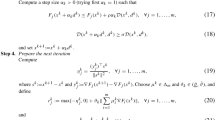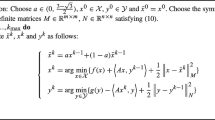Abstract
The multi-leader–follower game has many applications such as the bilevel structured market in which two or more enterprises, called leaders, have initiatives, and the other firms, called followers, observe the leaders’ decisions and then decide their own strategies. A special case of the game is the Stackelberg model, or the single-leader–follower game, which has been studied for many years. The Stackelberg game may be reformulated as a mathematical program with equilibrium constraints, which has also been studied extensively in recent years. On the other hand, the multi-leader–follower game may be formulated as an equilibrium problem with equilibrium constraints, in which each leader’s problem is an mathematical program with equilibrium constraints. However, finding an equilibrium point of an equilibrium problem with equilibrium constraints is much more difficult than solving a single mathematical program with equilibrium constraints, because each leader’s problem contains those variables which are common to other players’ problems. Moreover, the constraints of each leader’s problem depend on the other rival leaders’ strategies. In this paper, we propose a Gauss–Seidel type algorithm with a penalty technique for solving an equilibrium problem with equilibrium constraints associated with the multi-leader–follower game, and then suggest a refinement procedure to obtain more accurate solutions. We discuss convergence of the algorithm and report some numerical results to illustrate the behavior of the algorithm.
Similar content being viewed by others
Notes
There are several stationarity concepts in MPECs, such as strong (S-) stationarity, Bouligand (B-) stationarity and Clarke (C-) stationarity. Among those stationarity concepts, S-stationarity and B-stationarity are considered strong, in particular.
We found that there are some typos in Corollary 3.5 of [16]. Hence we corrected them.
References
Nash, J.: Equilibrium points in \(n\)-person games. Proc. Natl. Acad. Sci. USA 36, 48–49 (1950)
Nash, J.: Non-cooperative games. Ann. Math. 54, 286–295 (1951)
von Stackelberg, H.: Marktform und Gleichgewicht. Springer, Berlin (1934)
He, X., Prasad, A., Sethi, S., Gutierrez, G.: A survey of Stackelberg differential game models in supply and marketing channels. J. Syst. Sci. Syst. Eng. 16(4), 385–413 (2007)
Luo, Z., Pang, J., Ralph, D.: Mathematical Programs with Equilibrium Constraints. Cambridge University Press, Cambridge (1966)
Outrata, J., Kočvara, M., Zowe, J.: Nonsmooth Approach to Optimization Problems with Equilibrium Constraints. Applications and Numerical Results. Springer, Berlin (1998)
Chen, Y., Hobbs, B., Leyffer, S., Munson, M.: Leader–follower equilibria for electric power and NO\(_{x}\) allowances markets. Comput. Manag. Sci. 3, 307–330 (2006)
Hobbs, B., Metzler, C., Pang, J.: Strategic gaming analysis for electric power networks: an MPEC approach. IEEE Trans. Power Syst. 15, 638–645 (2000)
Leyffer, S., Munson, T.: Solving multi-leader-common-follower games. Optim. Methods Softw. 25(4), 601–623 (2010)
Pang, J., Fukushima, M.: Quasi-variational inequalities, generalized Nash equilibria, and multi-leader–follower games. Comput. Manag. Sci. 2, 21–56 (2006). Erratum. ibid., 6, 373–375 (2005)
Hu, M., Fukushima, M.: Variational inequality formulation of a class of multi-leader–follower games. J. Optim. Theory Appl. 151, 455–473 (2011)
Hu, M., Fukushima, M.: Multi-leader–follower games: models, methods and applications. J. Oper. Res. Soc. Jpn 58(1), 1–23 (2015)
Hu, M., Fukushima, M.: Smoothing approach to Nash equilibrium formulations for a class of equilibrium problems with shared complementarity constraints. Comput. Optim. Appl. 52, 415–437 (2012)
Outrata, J.: A note on a class of equilibrium problems with equilibrium constraints. Kybernetika 40(5), 585–594 (2004)
Su, C.: A sequential NCP algorithm for solving equilibrium problems with equilibrium constraints. Department of Management Science and Engineering, Stanford University, Tech. rep. (2004)
Huang, X., Yang, X., Zhu, D.: A sequential smooth penalization approach to mathematical programs with complementarity constraints. Numer. Funct. Anal. Optim. 27(1), 71–98 (2006)
Scheel, H., Scholtes, S.: Mathematical programs with complementarity constraints: stationality, optimality, and sensitivity. Math. Oper. Res. 25(1), 1–22 (2000)
Facchinei, F., Soares, J.: A new merit function for nonlinear complementarity problems. SIAM J. Optim. 7, 225–247 (1997)
Acknowledgements
The authors are grateful to an anonymous referee for careful reading of the manuscript and helpful comments. This work was supported in part by Grant-in-Aid for Scientific Research (C) (26330029) from Japan Society for the Promotion of Science.
Author information
Authors and Affiliations
Corresponding author
Rights and permissions
About this article
Cite this article
Hori, A., Fukushima, M. Gauss–Seidel Method for Multi-leader–follower Games. J Optim Theory Appl 180, 651–670 (2019). https://doi.org/10.1007/s10957-018-1391-5
Received:
Accepted:
Published:
Issue Date:
DOI: https://doi.org/10.1007/s10957-018-1391-5




